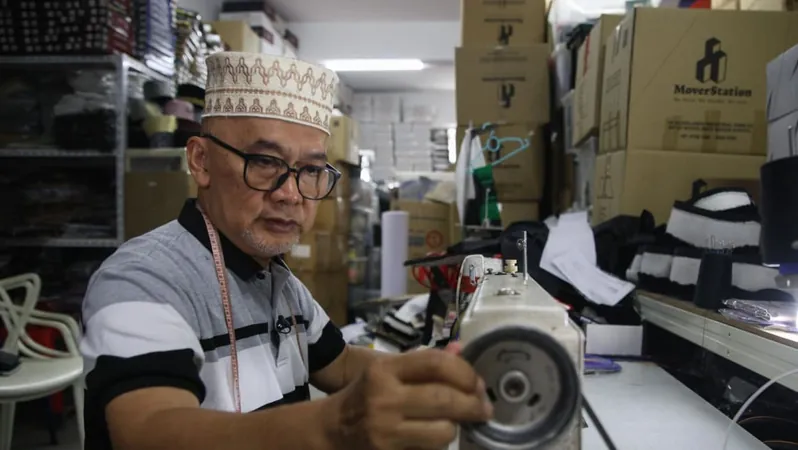
Groundbreaking Results in Phase 1 Trial of Bel-sar for Treating Non-Muscle-Invasive Bladder Cancer Presented at EAU Congress
2025-03-24
Author: Mei
Promising Outcomes from Phase 1 Clinical Trial
In a significant advancement for bladder cancer therapies, Aura Biosciences, Inc. (NASDAQ: AURA) revealed promising outcomes from its Phase 1 clinical trial utilizing bel-sar (AU-011) for patients diagnosed with Non-Muscle-Invasive Bladder Cancer (NMIBC). These findings were presented by Dr. Seth Lerner at the 40th Annual European Association of Urology (EAU) Congress, which recently took place in Madrid, Spain.
Study Design and Results
The Phase 1 trial involved 15 patients targeting the safety and feasibility of bel-sar, administered either alone or with light activation. The study divided participants into two groups: five receiving bel-sar without light activation and ten receiving the treatment with light activation. Notably, the latter group demonstrated remarkable results, particularly among those categorized with intermediate and high-risk NMIBC.
Among patients who received bel-sar with light activation, 80% of those with intermediate-risk NMIBC exhibited a clinical complete response, with no detectable tumor cells in histopathological evaluations. Additionally, there was clear evidence of immune activation within the tumor microenvironment, seen through significant infiltration of CD8+ and CD4+ T-cells, essential components of the body’s immune response against tumors. This is especially promising given that typical treatments can leave patients vulnerable to recurrent disease.
Safety Profile of Bel-sar
The favorable safety profile of bel-sar was equally noteworthy; adverse effects were rated as Grade 1 and were reported in less than 10% of the patient cohort, with no significant differences observed between the treatment modalities. The safety and tolerability results reinforce the potential of bel-sar as a non-invasive treatment option, eliminating the need for general anesthesia.
Expert Commentary
Dr. Sabine Brookman-May, Senior Vice President for Urologic Oncology at Aura, expressed her enthusiasm about the findings, stating, “These robust immune responses following a single low-dose treatment are a beacon of hope. Our data suggests that this unique mechanism could pave the way for longer-lasting therapeutic effects.”
Dr. Seth Lerner also emphasized that back-to-back successes point to bel-sar’s potential to reshape current treatment paradigms by offering a therapeutic alternative to Transurethral Resection of Bladder Tumor (TURBT). This could broaden the spectrum of treatments available to patients across various risk categories and ultimately improve their quality of life.
Future Implications and Upcoming Trials
The Phase 1 trial's design involved a series of evaluations, including monitoring immune activity and tumor response over a 56-day period post-treatment. These assessments may have implications for future clinical practice as researchers explore the biological activity of bel-sar, particularly its capacity to incite immune responses against bladder cancer more broadly—hinting at a urothelial field effect that extends treatment efficacy beyond the initial tumor site.
Aura Biosciences is actively progressing into further phases of trials, with an additional Phase 1b/2 trial already in planning stages to further dissect bel-sar’s clinical potential. This is an exciting time for both patients and researchers, as ongoing advancements in cancer therapies present new avenues for effectively battling this challenging disease.
Conclusion and Next Steps
Stay tuned for further updates as Aura Biosciences prepares for a virtual investor event where experts will discuss the Phase 1 trial data and outline future development frameworks to maximize bel-sar's potential against NMIBC.


 Brasil (PT)
Brasil (PT)
 Canada (EN)
Canada (EN)
 Chile (ES)
Chile (ES)
 Česko (CS)
Česko (CS)
 대한민국 (KO)
대한민국 (KO)
 España (ES)
España (ES)
 France (FR)
France (FR)
 Hong Kong (EN)
Hong Kong (EN)
 Italia (IT)
Italia (IT)
 日本 (JA)
日本 (JA)
 Magyarország (HU)
Magyarország (HU)
 Norge (NO)
Norge (NO)
 Polska (PL)
Polska (PL)
 Schweiz (DE)
Schweiz (DE)
 Singapore (EN)
Singapore (EN)
 Sverige (SV)
Sverige (SV)
 Suomi (FI)
Suomi (FI)
 Türkiye (TR)
Türkiye (TR)
 الإمارات العربية المتحدة (AR)
الإمارات العربية المتحدة (AR)